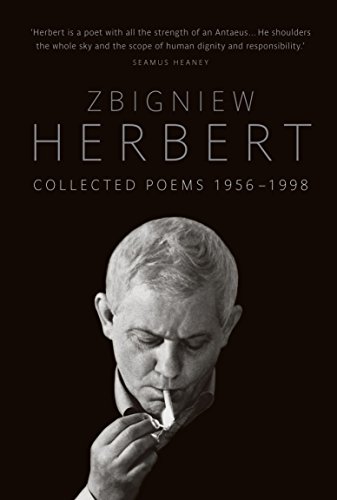One of my favourite poets in the whole wide world is Polish!
I discovered the works of Nobel Lit Prize Winner Wisława Szymborska as a secondary school kid, back in the nineties – loved them so much; huge influence on me, etc. Unfortunately, her output wasn’t huge, so there wasn’t an extra tome of her works I could check out for this project. And I’d already used Czesław Miłosz - Poland’s other Nobel Lit laureate – for my Lithuania book.
Fortunately, there are lots of famous Polish poets. Such as this guy:
I’d heard his name bantered about amongst my friends, so I
figured, yeah, why not read something of his? (Yeah, yeah, he was born in Lwow, which is now part of Ukraine, but it was Polish while he was a kid.)
This was the library’s only volume of his works – ye compleat edition, running to 571 pages. But mirabile dictu, it’s good. So good. (I’d considered abandoning it for Adam Zagajewski’s Eternal Enemies, a convenient, skinny little codex, but when I leafed through that, I found myself longing for the lambent voice of my man Herbert.)
This was the library’s only volume of his works – ye compleat edition, running to 571 pages. But mirabile dictu, it’s good. So good. (I’d considered abandoning it for Adam Zagajewski’s Eternal Enemies, a convenient, skinny little codex, but when I leafed through that, I found myself longing for the lambent voice of my man Herbert.)
We’ve nine different volumes of his poetry packed into this
tome:
Chord of Light (1956)
Hermes, Dog and Star (1957)
Sudy of the Object (1961)
Inscription (1969)
Mr Cogito (1974)
Report from a Besieged City (1983)
Elegy for the Departure (1990)
Rovigo (1992)
Epilogue to a Storm (1998)
So we get to follow this man from a post World War to a
post-Cold War era; from youth; from the age of 32 to 78. And over the five
decades we see his voice develop, shift from focus to focus, intensify and
mourn himself.
And it is the same voice throughout – a melancholy, erudite
voice, haunted both by the horrors of his own Communist (and pre-Communist)
society and the ghosts of classical history. He invokes Hermes, Apollo, Athena,
Marsyas, the Minotaur, Elektra, Claudius, Marcus Aurelius, Nefertiti – also
Mary Queen of Scots, George Orwell and the Emperor Meiji, come to think of it –
but not in a show-off-how-smart-I-am way, but to invoke archetypes of eternal
drama to show that the tyranny and torture of his land (of all lands) have ever
been thus.
Loads of specific references to his childhood and his Polish
contemporaries, too, which were a little harder to get. He calls himself Mr
Cogito (therefore he is?) in the latter half of his career, documenting what he
sees as his loserly life. But fundamentally, he’s engaged in the same Szymborska-esque
mission of mourning for the entire world, for the whole of history.
That hits me, you know? This is poetry that makes me want to
write more poetry. To join in the chorus as a testament. Gah.
(Though I personally do like Szymborska better still,
because she also finds joy in the senselessness of the universe. But it’s not a
competition. Is it?)
Representative quote:
I probably like his prose poems best, but this piece spoke of nation in a way that resonates a lot with me.
TAIL OF A NAIL
For lack of a nail the kingdom fell
- our nannies’ wisdom teaches us – but in our kingdom
there haven’t been nails for a long time nor will there be
neither those handy little ones used for hanging pictures
on a wall nor the big ones with which coffins are sealed
but in spite of this and perhaps precisely because of it
the kingdom endures and even gains others’ admiration
how is it possible to live without nails paper and string
bricks oxygen freedom and whatever else you like
evidently it is possible because it endures and endures
people in this country live in houses and not in caves
factories smoke in the steppe trains cross the tundra
and on the cold ocean a ship blows its bleating horn
there is an army and police a seal an anthem a flag
on the surface it’s just like the rest of the world
it is only on the surface because this kingdom of ours
is not a creation of nature or a creation of humanity
seemingly enduring built on the bones of mammoths
in reality it is weak as if suspended between
the act and the thought existence and nonexistence
a leaf and a stone fall so do all things real
but ghosts live a long time stubbornly despite
sunrise and sunset revolutions of celestial bodies
on the disgraced earth tears and things fall
Next book: Uladzimir Karatkevich's "King Stakh's Wild Hunt", from Belarus? Or Vladimir Kozlov's "Number Ten: A Novella In Translation"? Not sure yet.

No comments:
Post a Comment